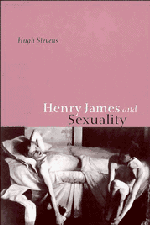Book contents
- Frontmatter
- Contents
- Preface
- Acknowledgements
- List of abbreviations
- 1 Henry James and the languages of sex
- 2 Gender and representation in The Wings of the Dove
- 3 Sexuality and the aesthetic in The Golden Bowl
- 4 The eroticism of prohibition: masochism and the law in Roderick Hudson
- 5 Queer plotting: The Bostonians and The Princess Casamassima
- 6 James's late short fiction and the spectacle of modern homosexuality
- 7 Suicide and blackmail: James's ‘poor sensitive gentlemen’
- Conclusion: ‘that queer monster the artist’
- Notes
- Bibliography
- Index
6 - James's late short fiction and the spectacle of modern homosexuality
Published online by Cambridge University Press: 28 October 2009
- Frontmatter
- Contents
- Preface
- Acknowledgements
- List of abbreviations
- 1 Henry James and the languages of sex
- 2 Gender and representation in The Wings of the Dove
- 3 Sexuality and the aesthetic in The Golden Bowl
- 4 The eroticism of prohibition: masochism and the law in Roderick Hudson
- 5 Queer plotting: The Bostonians and The Princess Casamassima
- 6 James's late short fiction and the spectacle of modern homosexuality
- 7 Suicide and blackmail: James's ‘poor sensitive gentlemen’
- Conclusion: ‘that queer monster the artist’
- Notes
- Bibliography
- Index
Summary
1 THE PLAY AND LANGUAGE OF ‘IDENTITY’: ‘MORA MONTRAVERS’ AND OTHER TALES
In the next two chapters I will be arguing that several of James's late tales – prominently ‘The Altar of the Dead’, ‘In the Cage’, ‘The Papers’, ‘Mora Montravers’, ‘Crapy Cornelia’, ‘The Jolly Corner’ and ‘A Round of Visits’ – make up a sophisticated, incisive, deeply considered, heartfelt response to the emergence of ‘homosexuality’ as a specific form of subjectivity, as a ‘sexual identity’. Many of these tales are already recognized as among James's finest work, but the persistent homoerotic thematics within them has not received any detailed commentary (because of existing readings of ‘The Pupil’ and ‘The Beast in the Jungle’, these two tales will not be considered here).
In James's late short fiction there is always a tension between a silence around which the tale hovers and which lends the tale momentum, and a violent content which threatens to disrupt the tale, fracture its aesthetic quietude. It is in fact this tension which needs to be productively read; only by acknowledging its influence can criticism avoid labelling the late short fiction as aesthetically rare but vapid, or collapsing the stories into symptomatic curiosities of an over-refined, over-developed sensibility curiously lacking in self-knowledge. And attention to the historical pressures informing such a tension enables James's late short stories to be read not only as masterpieces of narrative but as fully informed responses to anxieties surrounding the construction of identities (of various sorts) in turn-of-the-century Britain and America.
- Type
- Chapter
- Information
- Henry James and Sexuality , pp. 117 - 144Publisher: Cambridge University PressPrint publication year: 1998



